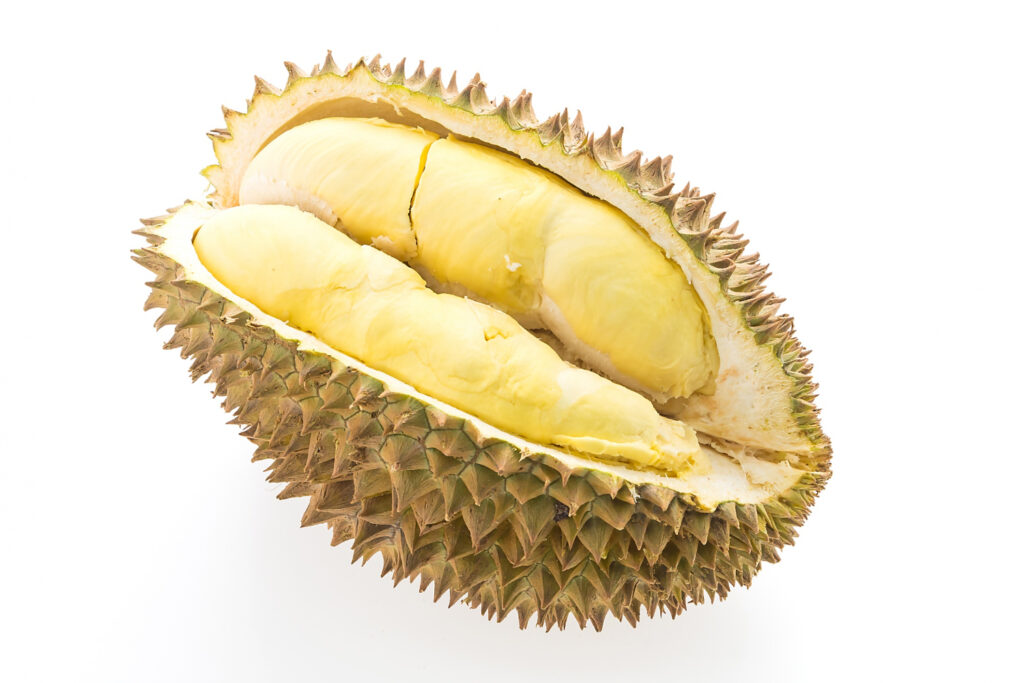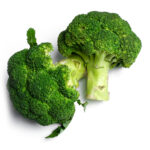
In this article
Durian (Durio Zibethinus Murr.) is a tropical fruit native to Southeast Asia, renowned as the “king of fruits” in countries like Indonesia and Thailand. This title is attributed to its dense nutritional profile and substantial size, with some fruits weighing over 17 pounds.
Durian is characterized by its creamy texture, a unique blend of sweet and slightly bitter flavors, and a distinct pungent odor. This fruit is packed with nutrients, including fiber, vitamin C, potassium, and B vitamins. Additionally, it is a rich source of antioxidants and anti-inflammatory compounds that promote overall health and protect against disease.
Supports Digestive Health
Durian is an excellent source of dietary fiber, with one cup of raw durian providing over 9 grams of fiber, meeting 33% of the daily fiber requirement. Fiber is crucial for digestive health as it helps prevent constipation, supports a balanced gut environment, and fuels probiotic bacteria. These bacteria produce short-chain fatty acids (SCFAs), which offer several health benefits, including reducing intestinal inflammation, strengthening the gut lining, and protecting against digestive diseases like colon cancer.
May Promote Heart Health
Consuming foods high in dietary fiber, such as durian, can protect against cardiovascular disease. Durian is not only rich in fiber but also contains 13 grams of fat, primarily monounsaturated fat. Monounsaturated fats are beneficial for heart health as they help regulate cholesterol levels, thereby reducing the risk of heart disease. Additionally, durian provides essential nutrients for heart health, such as magnesium and potassium, which help control blood pressure. It is also a good source of folate, which regulates homocysteine levels. Elevated homocysteine can increase inflammation, lead to plaque buildup in the arteries, and raise the risk of heart disease.
Aids in Weight Management
The fiber content in durian can support weight loss and weight management by promoting a feeling of fullness. Research involving 345 individuals found that fiber intake was the most significant predictor of body weight, independent of other factors like macronutrient and calorie intake. This suggests that increasing the consumption of fiber-rich foods like durian can effectively support weight management efforts.
May Protect Against Disease
Consuming foods high in antioxidants and anti-inflammatory compounds can boost overall health and reduce the risk of various health conditions. Durian is particularly high in vitamin C, a powerful antioxidant necessary for immune function. Diets rich in vitamin C may help protect against several common health conditions, including certain cancers and heart disease. Durian also contains protective plant compounds such as flavonoids and carotenoids, which protect cells from oxidative damage. This damage is a major factor in the development of diseases like heart disease and some cancers. Flavonoids found in durian, such as hesperidin, quercetin, rutin, kaempferol, luteolin, and apigenin, have been shown to reduce the risk of heart disease, cognitive decline, and neurodegenerative diseases like Alzheimer’s.
May Support Brain Health
A diet high in vitamin C, which durian can help provide, may benefit brain health. A study involving 80 older adults found that those with higher blood levels of vitamin C performed better on cognitive tasks involving recall, focus, memory, attention, decision-making, and recognition. One serving of durian provides over 50% of the daily vitamin C requirement, supporting brain health.
Nutrition of Durian
Durian is high in calories and fat compared to most other fruits, but it is also rich in fiber and several vitamins and minerals. A one-cup serving of raw durian contains:
- Calories: 357
- Fat: 13 grams
- Protein: 3.57 grams
- Carbohydrates: 65.9 grams
- Fiber: 9.23 grams
- Vitamin C: 47.9 milligrams (53% of the Daily Value)
- Copper: 0.5 milligrams (56% of the Daily Value)
- B6: 0.76 milligrams (45% of the Daily Value)
- Potassium: 1,060 milligrams (23% of the Daily Value)
- Folate: 87.5 micrograms (22% of the Daily Value)
- Magnesium: 72.9 milligrams (17% of the Daily Value)
- Niacin: 2.6 milligrams (16% of the Daily Value)
Durian’s high fiber content includes both soluble and insoluble fiber, promoting regular bowel movements, supporting beneficial gut bacteria growth, and regulating cholesterol levels to protect heart health. The fruit is also rich in essential vitamins and minerals, such as B6, necessary for red blood cell production and neurotransmitter synthesis, and vitamin C, vital for collagen production and immune function. The magnesium and potassium in durian are crucial for blood pressure regulation and overall heart health.
Risks of Durian
Durian is generally safe for most people to consume. However, its high potassium content can be a concern for those on potassium-restricted diets, such as individuals with advanced kidney disease. These individuals must manage their potassium intake to prevent hyperkalemia, a condition where potassium builds up in the blood and can be life-threatening. One case study reported that an older woman with kidney injury developed hyperkalemia after consuming large amounts of durian over several days. For people with normal kidney function, consuming durian is unlikely to cause harm.
The high fiber content in durian may also cause digestive side effects like bloating, gas, and diarrhea, particularly in people unaccustomed to fiber-rich diets. It is advisable to introduce durian and other high-fiber foods gradually to allow the body to adjust. Additionally, durian’s high carbohydrate content means that those on low-carb diets should consume it in moderation.
Tips for Consuming Durian
Durian can be found in specialty stores, such as high-end grocers or Asian grocery stores, and can also be purchased online. When handling durian, take care due to its spiky rind and strong odor. To prepare durian:
- Hold the durian firmly on its side with one hand and use a sharp knife to make a 3-4 inch cut through the rind lengthwise.
- Pull back the durian skin to split the fruit in two and expose the inner segments.
- Use a spoon to scoop out the inner segments of the fruit.
- Remove the seeds before consuming.
Durian is usually enjoyed raw but can also be added to dishes like sticky rice and baked goods. Its creamy texture and sweet taste make it a popular ingredient in desserts such as ice cream, smoothies, and cakes
A Quick Review
Durian, native to Southeast Asia, is a nutrient-dense fruit known for its creamy texture and strong odor. It’s packed with fiber, vitamins, and antioxidants, supporting digestive health, heart health, weight management, and brain function. Despite its high potassium content, which may be a concern for those with kidney issues, durian offers numerous health benefits when consumed in moderation.Focus Keyword












